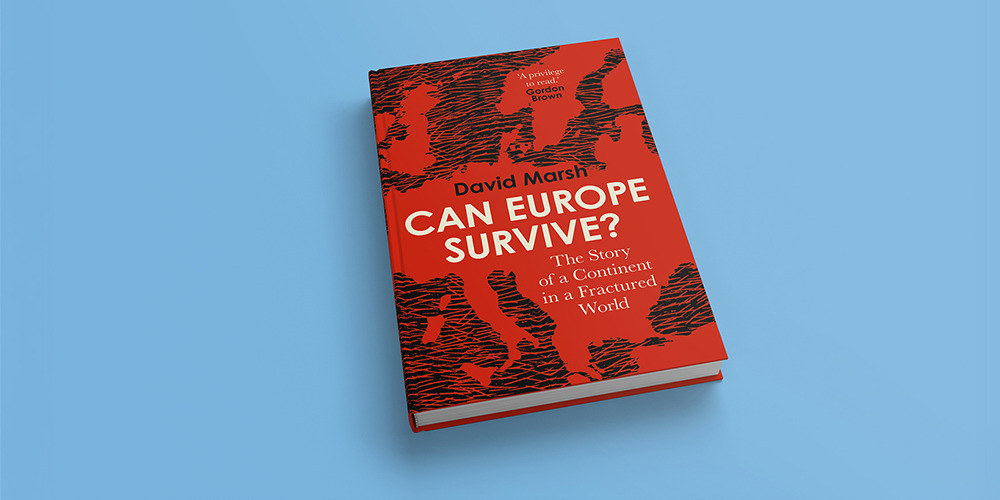Europe is beset by a fast-changing, polarised world dominated by Chinese-American rivalry. In the three-and-a-half decades since the fall of the Berlin Wall, the European Union and the continent as a whole have failed to implement a strategy for success. Britain’s EU exit has weakened both sides. Vladimir Putin’s machinations, Russia’s invasion of Ukraine, China’s rise and Donald Trump’s shocks highlight the shortcomings. Germany, under the fresh but increasingly embattled leadership of Chancellor Friedrich Merz, is desperately trying to recover lost ground and lead Europe into a better future. But the continent’s show of solidarity in economic policies and defence cannot cover up underlying fractures.
How well equipped are the Europeans to face the coming challenges? After 500 years of dominance in world history, is their fall from grace irreversible? Or can Europe surmount Trump and Putin and usher in a new era of resilience? A new book by OMFIF Chairman David Marsh, Can Europe Survive? The Story of a Continent in a Fractured World, unpacks these questions.
It is not too late for remedial action – of the sort recommended in the September 2024 competitiveness report by Mario Draghi, the former Italian prime minister and European Central Bank president. But progress on implementation has been agonisingly slow.
As Europe faces its gravest test since the second world war, Marsh shows how Europe must find fresh reserves of resolve and purpose in building on its underlying strengths. Among the renewed international partnerships required for success, an improved relationship with the UK in finance, trade and security will be of paramount importance.
The stakes could hardly be higher. The shortcomings of the past add up to a heavy future burden for European citizens – and threaten a painful adjustment to a new era where Europe may play no more than a supplicant role in a new and unforgiving world order.
Examining untold stories
Drawing on unpublished archives and interviews with more than 150 key players, Marsh reveals how the US was in full control over German unification and Soviet break-up, as well as evidence of American foreknowledge of the Russian and Ukrainian path to war.
In addition, Can Europe Survive? contains previously untold stories about the workings of the European Central Bank, examines why Germany under Chancellor Angela Merkel became over-dependent on Russian energy and pinpoints the long build-up to decades of US disquiet over Europe’s Nato defence ‘freeloading’
The book sheds light on 10 key issues.
- A new analysis of how and why the UK left the EU – and what Prime Minister Keir Starmer must do to make a success of the ‘reset’
- How Trump is playing with fire over the dollar – and the challenges in establishing a more solid international role for the euro
- The dilemmas behind Europe’s fraught technology relationship with China
- The ruinous effect on Britain’s international reputation of the Boris Johnson and Liz Truss premierships
- Reasons for the surge of ‘populism’ in key countries, with particularly debilitating effects on France and Germany – now an alarming trend in the UK, too
- The psychological factors behind Putin’s early successes in western diplomacy – and his startling continuity with Soviet cold war leaders
- Why latent instability in economic and monetary union has not gone away
- How Germany’s new leader is trying to repair the badly strained Franco-German partnership
- What could go wrong with Europe’s efforts to stand up to Trump: the flaws behind the EU’s plans for ‘strategic autonomy’
- Why a better balance in strategic partnerships under a model of ‘variable geometry’ holds the key to Europe’s future
In the book’s foreword, Joachim Nagel, president of the Deutsche Bundesbank, writes that, as Germany’s central bank chief and a member of the ECB governing council, ‘I am both one of the actors in this book and an addressee of its analyses and appeals. While I can concur with many of the evaluations and assessments, I find myself at odds with others. This mixture of agreement and disagreement shows me just how extremely thought-provoking this book is.’
Calling the book a ‘splendid contemporary historical overview’, Nagel adds: ‘I find the recurring theme of political responsibility and accountability particularly stimulating. David Marsh places this question firmly in the foreground and, through his historical reflections, offers a perspective that helps us discuss our strategies for the future.’
Gordon Brown, former British prime minister and chancellor of the exchequer, describes the book as ‘a privilege to read. David Marsh’s meticulous research brought together over many years provides great insight into both challenges and opportunities for Europe and deserves the widest possible circulation.’
Lord Mervyn King, former governor of the Bank of England, writes: ‘From the fall of the Berlin Wall to the invasion of Ukraine and tariff wars, Europe has been subject to revolutionary changes. Based on intensive research, there is no better guide to these events, and their implications for our future, than David Marsh’s fascinating book.’
Philip Zelikow, Botha-Chan senior fellow at Stanford University’s Hoover Institution, says, ‘Europe is now a “swing” region that can determine the fate of the world, whether through weakness or choice. Combining a journalist’s wit and a historian’s care, David Marsh sizes up both past and present with a rare balance of understanding between the people, the politics, and the economics.’
Preorder Can Europe Survive? The Story of a Continent in a Fractured World now.

Interested in this topic? Subscribe to OMFIF’s newsletter for more.
